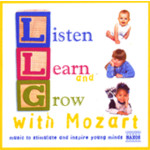
Listen Learn And Grow With Mozart: Music to stimulate and inspire young minds
 $25.00
Low Stock
add to cart
$25.00
Low Stock
add to cart
MOZART / VIVALDI / BACH / ROSSINI / PACHELBEL / HAYDN
Listen Learn And Grow With Mozart: Music to stimulate and inspire young minds
Various performers from the Naxos catalogue
[ Naxos / CD ]
Release Date: Wednesday 1 June 2011
Should this item be out of stock at the time of your order, we would expect to be able to supply it to you within 2 - 5 business days.
Music to stimulate and inspire the mind.
Listen to classical music
When we think about our ears, we usually focus on hearing. That is certainly the most obvious function, but there is more to the ear than hearing.
Scientific research has verified that the ear is the first organ to be fully functional, being completely formed when the fetus is four and a half months old. This is why stimulation to the central nervous system, via music, provides an important ingredient to your child's early brain development.
Musical sounds are among the first stimuli that an infant responds to and your baby will enjoy music instinctively; but what type of music is "good" for your baby? Recent studies have shown that certain types of music - especially the music of the classical composer Wolfgang Amadeus Mozart - have had many positive effects when played for newborns and older children.
Learn with classical music
From the moment children are born they enter a new world of light, energy and sound. Every moment becomes a new experience in mental and sensory stimulation. It is important that your newborn is provided with the best stimuli possible to encourage the development of communication skills, attention span, quality of speech, memory and maturity.
Scientists are just beginning to understand how classical music can provide stimulation to the developing brain. Recent studies have shown that the cortical neurons, which are used for such things as mathematics and abstract reasoning, respond more quickly and are strengthened by the rhythms, melodies and high frequencies that are found in classical music.
And Grow
At a very early age, children have the ability to perceive patterns and how they develop. The rhythms, melodies, and high frequencies of classical music stimulate and charge the creative and motivational regions of the brain: it is these specific frequencies and patterns that "exercise" the neural pathways in your child's brain.
During every stage of your child's development, creativity is a central part of their inner growth. As children grow, so does their need to expand upon what they've learned.
We at Naxos of America believe that classical music can and does provide the stimuli needed to help your child realize their full potential. The music presented here is meant to last a lifetime; a lifetime of listening, learning and growing.
From the very beginning the Naxos label was meant to make classical music more accessible to the average person by making it more affordable. More than any other classical record label, major or independent, Naxos has also made an important effort to educate future audiences by producing educational material - from our acclaimed A to Z of Classical Music and How to Build a Classical Music Collection to our latest brochure, How to Enjoy a Live Concert. Naxos presently provides financial support to several ongoing educational projects.
Music for Children offers advice and the tools necessary for parent and primary school teachers to teach music and dance to children ages 6-10. Attaca is a music education course developed by a Swedish educator for students ages 10-18, which will also be made available in an English version in the United States. We are also supporting I-Cubed an internet based music appreciation course for college and university students.
By making classical music available to families, Naxos will play an important part in helping children to maximize their future potential. We at Naxos are proud of that fact. Classical music will improve a child's learning capabilities. It can help them to become more balanced human beings and generally enrich their lives.
Tracks:
Mozart, Wolfgang Amadeus
Divertimento in D major, K. 136, "Salzburg Symphony No. 1": I. Allegro
Boccherini, Luigi
Minuet
Mozart, Wolfgang Amadeus
Clarinet Quintet: Allegretto con variazione
Bach, Johann Sebastian
Suite No. 3 : Air
Rossini, Gioachino
Barber of Seville: Overture
Haydn, Franz Joseph
Cello Concerto No. 2 : Rondo: Allegro
Handel, George Frideric
Water Music: Suite No. 3 in G major, HWV 350: I. Sarabande
Mozart, Wolfgang Amadeus
Serenade No. 13 in G major, K. 525, "Eine kleine Nachtmusik": II. Romance
Flute Concerto No. 2 in D major, K. 314: III. Allegro
Divertimento No. 15 in B flat major, K. 287, "Lodron Night Music No. 2": V. Menuetto
Divertimento in B flat major, K. 137, "Salzburg Symphony No. 2": III. Allegro assai
Pachelbel, Johann
Canon
Vivaldi, Antonio
The 4 Seasons: Violin Concerto in F minor, Op. 8, No. 4, RV 297, "L'inverno" (Winter): II. Largo
The 4 Seasons: Violin Concerto in F major, Op. 8, No. 3, RV 293, "L'autunno" (Autumn): III. Allegro